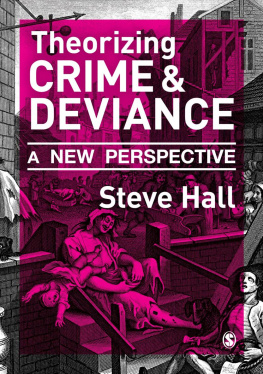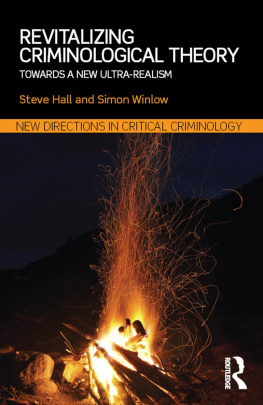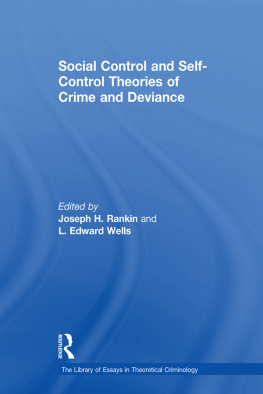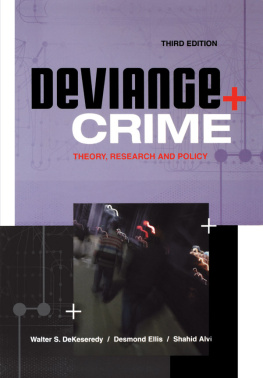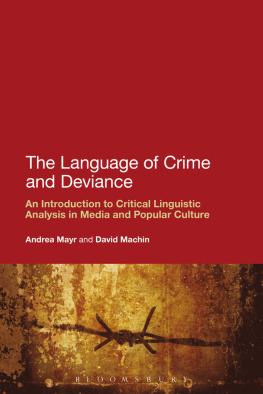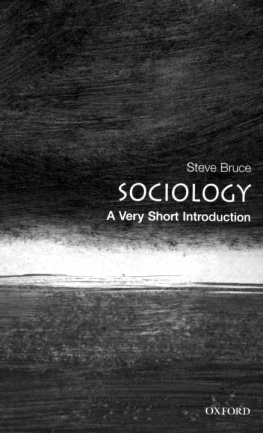Theorizing
CRIME & DEVIANCE
The book is dedicated to Christine, Christopher and Alexandra
Theorizing
CRIME & DEVIANCE
A NEW PERSPECTIVE
Steve Hall
Steve Hall 2012
First published 2012
Apart from any fair dealing for the purposes of research or private study, or criticism or review, as permitted under the Copyright, Designs and Patents Act, 1988, this publication may be reproduced, stored or transmitted in any form, or by any means, only with the prior permission in writing of the publishers, or in the case of reprographic reproduction, in accordance with the terms of licences issued by the Copyright Licensing Agency. Enquiries concerning reproduction outside those terms should be sent to the publishers.
SAGE Publications Ltd
1 Olivers Yard
55 City Road
London EC1Y 1SP
SAGE Publications Inc.
2455 Teller Road
Thousand Oaks, California 91320
SAGE Publications India Pvt Ltd
B 1/I 1 Mohan Cooperative Industrial Area
Mathura Road, Post Bag 7
New Delhi 110 044
SAGE Publications Asia-Pacific Pte Ltd
3 Church Street
#1004 Samsung Hub
Singapore 049483
Library of Congress Control Number: 2011933875
British Library Cataloguing in Publication data
A catalogue record for this book is available from the British Library
ISBN 9781848606715
ISBN 9781848606722 (pbk)
Typeset by C&M Digitals (P) Ltd, Chennai, India
Printed in India by Replika Press Pvt. Ltd
Printed on paper from sustainable resources
Every civilization which disavows its barbarian potential has already capitulated to barbarism.
Slavoj iek
There is a god of the marketplace, Eshu; he is a trickster, all mouth and balls.
(Yoruba saying)
CONTENTS
ABOUT THE AUTHOR
Steve Hall is Professor of Criminology at Teesside University. In the 1970s he was a nomadic musician, general labourer and avid reader of anything political or philosophical. In the 1980s he worked with young offenders in the deindustrializing north-east of England, and he was active politically during the steelworks and mine closures in County Durham. In 1988 he returned to university, and after graduating began teaching, researching and publishing. He has published widely in the fields of criminology, sociology, history and radical philosophy. His recent book Criminal Identities and Consumer Culture (with Simon Winlow and Craig Ancrum) has been described as an important landmark in criminology.
ACKNOWLEDGEMENTS
I would like to thank academic colleagues too numerous to mention who have given me conversations and support during a time when ideas are being replaced by impacts and respect by citation statistics, especially Robert Reiner, Ronnie Lippens, Colin Webster, Colin Sumner, Steve Taylor and Pat Carlen. Thanks to Bob Lilly and Elliott Currie for support over the pond and to Jeff Ferrell for the transatlantic duel, which I think he might have won, but who am I to judge? Thanks also to John Lea for pointing out a potentially embarrassing statistical howler. Very special thanks must go to Mike Randall and Simon Winlow for their invaluable friendship and collaboration over the years, and to my MA and PhD students for so many stimulating conversations, especially Mark Horsley and Kate Burdis. Thanks, too, to all the Criminology staff at the School of Social Sciences and Law at Teesside University for offering me a port in a storm. Most of all, thanks to my family, Chrissie, Chris and Alex, for putting up with me.
S ince the 1980s criminological theory seems to have fallen into a condition of permanent crisis, unable to offer convincing explanations of the fundamental criminological question: why individuals or corporate bodies are willing to risk the infliction of harm on others in order to further their own instrumental or expressive interests. This book is an examination of that aetiological crisis (Young, 1987), but from a perspective which raises the suspicion that the crisis was not a product of the disciplines entry into an entropic phase, but, on the contrary, to a large extent wilfully self-constructed. In this period Western criminological theory seemed to shift into its own customized mode of what Slavoj iek (2010a and passim) calls fetishistic disavowal, no longer wanting to know what creates the conditions in which rates of harmful crime increase to elicit the seemingly inevitable punitive reaction orchestrated by neoliberal governments. So resolute was the flight from aetiology that only a small number of approved explanations were allowed to remain in place as the foundations of non-conservative criminological thought.
These approved explanations will be examined as the books argument unfolds. It will also investigate why, in this broad and enduring act of equivocation, various schools of criminological thought have systematically deselected specific theories and concepts that are, or could be, genuinely potent in their ability to explain criminogenic conditions and subjectivities and suggest specific anti-criminogenic forms of regulation or transformation at the deep level of economic and cultural practice. The result is that criminological theory is now largely anodyne, entropic, and politically ineffective. However, after recent events such as the financial crisis and the North African revolutions, it would appear that we are now entering a difficult phase of advanced capitalism where the restrictive intellectual current that has been dominant since the 1980s is running out of momentum. Many thinkers are now coming to the understanding that the visceral subject is far more than an effect of language and discourse, that history has not ended, that the economy is without doubt a major part of the bedrock of human existence, and that politics are far from dead. Crime might have undergone a recent statistical drop in Britain and the USA, but there is little doubt that illegal markets, criminal trafficking, violence and intimidation are now normalized aspects of socio-economic activity in a socially divided and politico-economically insecure world whose subjects are increasingly drawn towards the impoverished culture of consumerism.
In this climate Reiner (2007) suggests that criminology should return to the investigation of motivation, as do Gadd and Jefferson, who argue for a new psychosocial criminology that shows a willingness to move beyond the rhetoric of folk devils and moral panics ... to address the question of who these folk devils really are, what they have done and why and to try to make sense of their motives (2007: 186). This book is an attempt to construct the beginnings of what could be called a new theoretical perspective, but, of course, new only in the sense that the ideas it imports are reconfigured and synthesized in a marginally different way. Whether such synthesis produces originality is left to the reader to decide, but the purpose of the book is not to produce novelty, nor indeed closure, but an initial theoretical framework with at least some degree of explanatory power.


